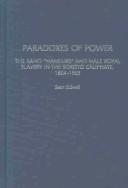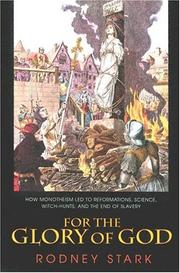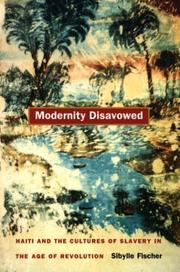| Listing 1 - 7 of 7 |
Sort by
|
Book
Year: 2004 Publisher: Verenigde Naties
Abstract | Keywords | Export | Availability | Bookmark
 Loading...
Loading...Choose an application
- Reference Manager
- EndNote
- RefWorks (Direct export to RefWorks)
Slavernij --- Geschiedenis --- Mensenhandel --- Prostitutie --- Kindsoldaat

ISBN: 9780325070407 0325070415 0325070407 Year: 2004 Publisher: Portsmouth : Heinemann,
Abstract | Keywords | Export | Availability | Bookmark
 Loading...
Loading...Choose an application
- Reference Manager
- EndNote
- RefWorks (Direct export to RefWorks)
Fulani Empire
---
Fulani Empire
---
Islam.
---
Mamelukes.
---
Mamelukes.
---
Sklaverei.
---
Slavernij.
---
Slavery
---
Slavery
---
Politics and government.
---
Politics and government.
---
Fulani Empire.
---
Geschichte 1804-1903.
---
Kalifat Sokoto.
---
Sokoto

ISBN: 3515083839 9783515083836 Year: 2004 Volume: 173 Publisher: Stuttgart : Steiner,
Abstract | Keywords | Export | Availability | Bookmark
 Loading...
Loading...Choose an application
- Reference Manager
- EndNote
- RefWorks (Direct export to RefWorks)
Slavery --- Esclavage --- Rome --- Social conditions --- Civilization. --- History --- Conditions sociales --- Civilisation --- Histoire --- Officials and employees --- Politics and government --- 326 --- 937 --- Slavernij--(algemeen) --- Geschiedenis van Rome tot 476 --- Social sciences Slavery and emancipation --- Officials and employees. --- Social conditions. --- 937 Geschiedenis van Rome tot 476 --- 326 Slavernij--(algemeen) --- Rim --- Roman Empire --- Roman Republic (510-30 B.C.) --- Romi (Empire) --- Byzantine Empire --- Rome (Italy) --- 937 History of ancient Rome (to 476 AD) --- History of ancient Rome (to 476 AD) --- Slavery - Rome --- Rome - Officials and employees --- Rome - Politics and government - 30 BC-476 AD --- Rome - History - Empire, 30 BC-476 AD --- Rome - Officials and employees - Social conditions --- Rome - Social conditions

ISBN: 0691119503 9780691119502 0691114366 1400866804 9780691114361 Year: 2004 Publisher: Princeton, N.J. Princeton University Press
Abstract | Keywords | Export | Availability | Bookmark
 Loading...
Loading...Choose an application
- Reference Manager
- EndNote
- RefWorks (Direct export to RefWorks)
Rodney Stark's provocative new book argues that, whether we like it or not, people acting for the glory of God have formed our modern culture. Continuing his project of identifying the widespread consequences of monotheism, Stark shows that the Christian conception of God resulted--almost inevitably and for the same reasons--in the Protestant Reformation, the rise of modern science, the European witch-hunts, and the Western abolition of slavery. In the process, he explains why Christian and Islamic images of God yielded such different cultural results, leading Christians but not Muslims to foster science, burn "witches," and denounce slavery. With his usual clarity and skepticism toward the received wisdom, Stark finds the origins of these disparate phenomena within monotheistic religious organizations. Endemic in such organizations are pressures to maintain religious intensity, which lead to intense conflicts and schisms that have far-reaching social results. Along the way, Stark debunks many commonly accepted ideas. He interprets the sixteenth-century flowering of science not as a sudden revolution that burst religious barriers, but as the normal, gradual, and direct outgrowth of medieval theology. He also shows that the very ideas about God that sustained the rise of science led also to intense witch-hunting by otherwise clear-headed Europeans, including some celebrated scientists. This conception of God likewise yielded the Christian denunciation of slavery as an abomination--and some of the fiercest witch-hunters were devoted participants in successful abolitionist movements on both sides of the Atlantic. For the Glory of God is an engrossing narrative that accounts for the very different histories of the Christian and Muslim worlds. It fundamentally changes our understanding of religion's role in history and the forces behind much of what we point to as secular progress.
Monotheism --- Reformation. --- Religion and science --- Witchcraft --- Slavery --- History. --- Religious aspects --- Religion and civilization. --- Sociology of religion --- Comparative religion --- Christian church history --- Religion and civilization --- Civilization and religion --- Civilization --- History --- Monotheïsme --- Geschiedenis --- Godsdienst --- Reformatie --- Heksen --- Slavernij --- Wetenschappen --- SOCIAL SCIENCE / Sociology of Religion. --- Reformatie (religie) --- Wetenschap --- Geneeskunde --- Techniek (wetenschap) --- Filosofie --- Psychologie --- Sociologie --- Kunst --- Atlas --- Museum --- Autisme --- Cultuur --- Kind --- Samenleving --- Technologie --- Historische kritiek --- Man --- Erfelijkheidsleer --- Stadssamenleving --- Maatschappij --- Verpleegkunde --- Volwassene --- Voorlichting --- Monotheism - History --- Reformation --- Religion and science - History --- Witchcraft - History --- Slavery - Religious aspects - History

ISBN: 9780822332909 Year: 2004 Publisher: Durham : Duke University Press,
Abstract | Keywords | Export | Availability | Bookmark
 Loading...
Loading...Choose an application
- Reference Manager
- EndNote
- RefWorks (Direct export to RefWorks)
Modernity Disavowed is a pathbreaking study of the cultural, political, and philosophical significance of the Haitian Revolution (1791-1804). Revealing how the radical antislavery politics of this seminal event have been suppressed and ignored in historical and cultural records over the past two hundred years, Sibylle Fischer contends that revolutionary antislavery and its subsequent disavowal are central to the formation and understanding of Western modernity. She develops a powerful argument that the denial of revolutionary antislavery eventually became a crucial ingredient in a range of hegemonic thought, including Creole nationalism in the Caribbean and G.W.F. Hegel's master-slave dialectic. Fischer draws on history, literary scholarship, political theory, philosophy, and psychoanalytic theory to examine a range of material, including Haitian political and legal documents and nineteenth-century Cuban and Dominican literature and art. She demonstrates that at a time when racial taxonomies were beginning to mutate into scientific racism and racist biology, the Haitian revolutionaries recognized the question of race as political. Yet, as the cultural records of neighboring Cuba and the Dominican Republic show, the story of the Haitian Revolution has been told as one outside politics and beyond human language, as a tale of barbarism and unspeakable violence. From the time of the revolution onward, the story has been confined to the margins of history: to rumors, oral histories, and confidential letters. Fischer maintains that without accounting for revolutionary antislavery and its subsequent disavowal, Western modernity - including its hierarchy of values, depoliticization of social goals having to do with racial differences, and privileging of claims of national sovereignty - cannot be fully understood.
15.85 history of America. --- Blacks --- Blacks --- Blacks. --- Esclavage dans la littérature. --- Franse Revolutie. --- Literature and history. --- Literature and history. --- Littérature et histoire. --- Noirs --- Noirs --- Révoltes d'esclaves. --- Sklaverei. --- Slave insurrections. --- Slave insurrections. --- Slavernij. --- Slavery in literature. --- Slavery in literature. --- Unabhängigkeitskrieg. --- History --- History --- Histoire --- Histoire --- Revolution (Haiti : 1791-1804). --- 1791-1804. --- Geschichte 1791-1804. --- Cuba. --- Dominican Republic. --- Haiti --- Haiti. --- Haiti. --- Haïti --- History --- Literature and the revolution --- Histoire --- Littérature et révolution
Book
ISBN: 9022317978 Year: 2004 Publisher: Antwerpen Manteau
Abstract | Keywords | Export | Availability | Bookmark
 Loading...
Loading...Choose an application
- Reference Manager
- EndNote
- RefWorks (Direct export to RefWorks)
Travail des femmes --- Vrouwenarbeid --- #SBIB:316.334.2A341 --- 647 --- arbeidsomstandigheden --- huishoudelijke arbeid --- Arbeidssociologie: ongelijkheden op de arbeidsmarkt: de vrouw en de arbeidsmarkt --- Huishoudelijk personeel. Dienstpersoneel --- Foreign workers --- Household employees --- vreemdelingen --- #SBIB:054.AANKOOP --- #SBIB:316.346H22 --- #SBIB:316.8H16 --- 450 Werkgelegenheid en arbeid --- #A0410A --- Domestic employees --- Domestic service employees --- Domestic service workers --- Domestics --- Household staff --- Household workers --- Servants --- Service employees, Domestic --- Service workers, Domestic --- Employees --- Alien labor --- Aliens --- Foreign labor --- Guest workers --- Guestworkers --- Immigrant labor --- Immigrant workers --- Migrant labor (Foreign workers) --- Migrant workers (Foreign workers) --- 331 --- 331.05 --- 325 --- Positie van de vrouw in de samenleving: arbeid en beroep --- Welzijns- en sociale problemen: migranten, rassenrelaties --- Employment --- Private law --- Housekeeping --- Sociology of minorities --- Belgium --- Provincie West-Vlaanderen --- Noncitizen labor --- Noncitizens --- 320 --- slavernij --- mensenhandel --- België 20ste eeuw --- sociale vraagstukken --- questions sociales --- Migration background --- Undocumented --- Book --- Service staff --- Discrimination --- Experiences

ISBN: 0415333024 9780415333023 0415758858 1134318618 128017112X 0203412648 113431860X 9780203412640 Year: 2004 Volume: 4 Publisher: London ; New York : Routledge,
Abstract | Keywords | Export | Availability | Bookmark
 Loading...
Loading...Choose an application
- Reference Manager
- EndNote
- RefWorks (Direct export to RefWorks)
This book is a significant contribution to existing research on the themes of race and slavery in the founding literature of the United States. It extends the boundaries of existing research by locating race and slavery within a transnational and 'oceanic' framework. The author applies critical concepts developed within postcolonial theory to American texts written between the national emergence of the United States and the Civil War, in order to uncover metaphors of the colonial and imperial 'unconscious' in America's foundational writing. The book analyses the writings of canonized autho
African Americans in literature --- Afro-Americans in literature --- Afro-Amerikanen in de literatuur --- Afro-Américains dans la littérature --- Amerikaanse zwarten in de literatuur --- Black Americans in literature --- Blacks in literature --- Cooper, James Fenimore, 1789-1851. The Red Rover --- Esclavage dans la littérature --- Esclaves dans la littérature --- Esclaves--Commerce dans la littérature --- Negroes in literature --- Noirs américains dans la littérature --- Noirs dans la littérature --- Slave trade in literature --- Slaven in de literatuur --- Slavenhandel in de literatuur --- Slavernij in de literatuur --- Slavery in literature --- Slaves in literature --- Zwarte Amerikanen in de literatuur --- Zwarten in de literatuur --- African Americans in literature. --- African Americans --- American literature --- Blacks in literature. --- Slave trade in literature. --- Slavery in literature. --- Intellectual life --- African American authors --- History and criticism. --- History and criticism --- English literature --- Agrarians (Group of writers) --- Slavery and slaves in literature --- African American authors&delete& --- Atlantic Ocean Region --- Atlantic Area --- Atlantic Region --- In literature. --- 19th century --- 1783-1850 --- Equiano, Olaudah --- Brown, Charles Brockden --- Melville, Herman --- Criticism and interpretation --- Poe, Edgar Allan --- Atlantic Region in literature --- Black people in literature. --- Enslaved persons in literature
| Listing 1 - 7 of 7 |
Sort by
|

 Search
Search Feedback
Feedback About UniCat
About UniCat  Help
Help News
News